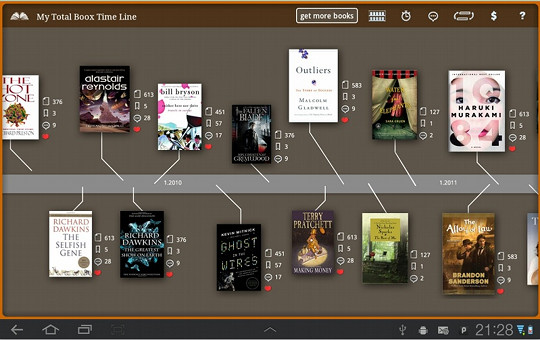Here’s an interesting new concept. An Israel-based company called Total Boox is launching a new platform for ebook reading and distributing in 2013 that allows people to pay only for the parts of an ebook that they actually read.
Instead of the “buy now, read later” approach of today’s ebookstores, Total Boox aims to let users download whatever ebooks they want and then pay based on the actual usage of the ebook. If a person only ends up reading 10% of the book, they only have to pay 10% of the price. You can even flip through all the pages for free; you only have to pay for a page if it stays open for longer than 6 seconds.
This could be very useful for expensive textbooks and reference material for students that only need to buy a chapter or two. It could also be a good way to reward good authors and punish bad ones. If an ebooks isn’t very good then simply stop reading it and the author doesn’t make as much money, and you don’t have to pay full price for something that you don’t want to read.
Right now Total Boox only has a few of the smaller publishers, including F+W Media and Sourcebooks, signed up to use their platform, with about 10,000 ebooks available. If they could somehow manage to get some of the big publishers onboard with the idea then something like this could really take off.
Imagine being able to have access to easily download any ebooks that you want, and then only having to pay full price for the good ones that you read all the way through. I, for one, start far more books than I ever finish. I’m a very picky reader and won’t waste time with something I don’t like, even if the book is by one of my favorite authors.
Total Boox already has a beta version of an Android app available for download from the Google Play store, and is expected to release an iPad/iPhone app in February.
So what do you think? Can this kind of “pay for what you read” distribution system really work?


I have a suspicion that the Big Six won’t want anything to do with this. Great idea though.
This won’t work, I think, because 6 seconds are enough time to make a screenshot of a page and pirate the book this way.
I don’t see that as an issue at all. There are much easier methods for pirating than taking the time to screenshot every single page.
Piracy is a different issue with respect to this topic. This idea, as I believe at this moment, is not about preventing modern Piracy. Rather, whether the Big Publishers would join here(?) is a relevant discussion indeed.